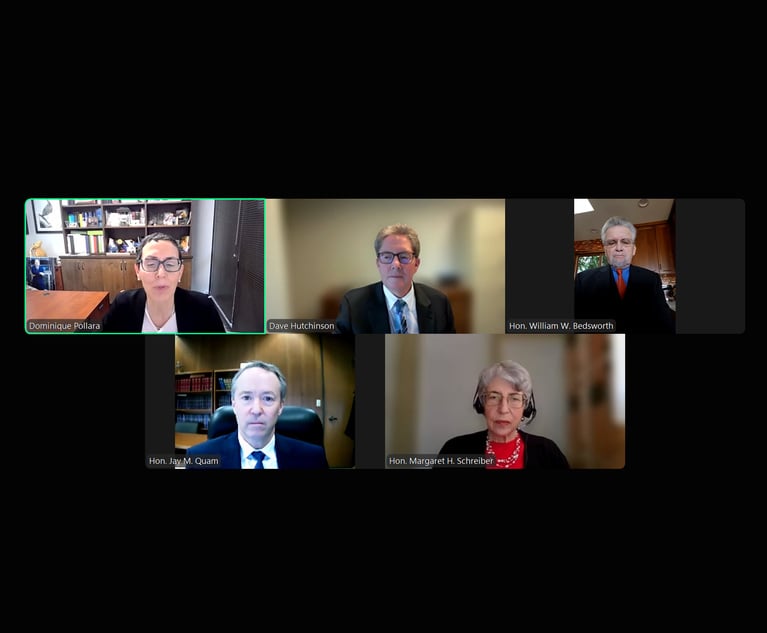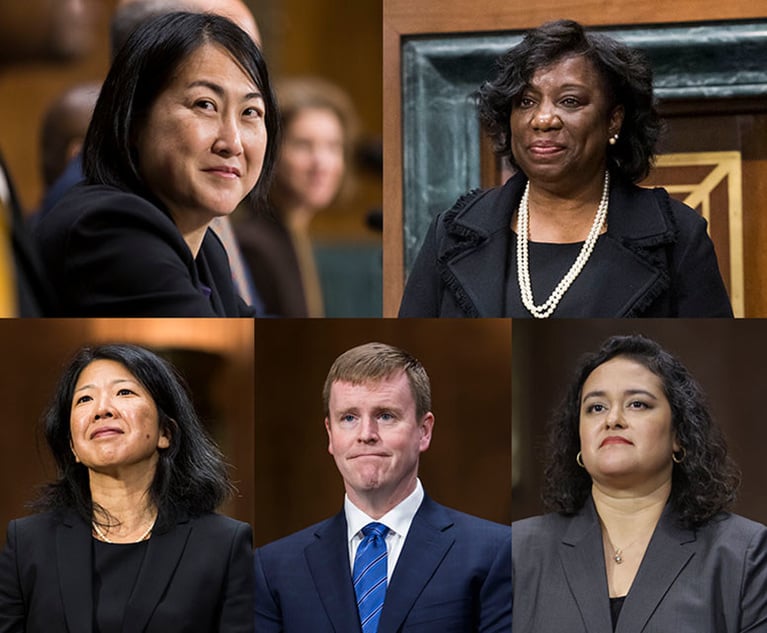 Kelly Woodruff of the California Appellate Law Group/courtesy photo
Kelly Woodruff of the California Appellate Law Group/courtesy photoOn Appeals: Appellate Courts Won't Save You When You Rely on Inadmissible Evidence
One of the most common mistakes appellate specialists see in civil appeals is the submission of inadmissible evidence in support of (or opposition to) a pretrial motion.
May 22, 2020 at 04:53 PM
6 minute read
Imagine: You have been defending your client in litigation for over two years. You've taken dozens of depositions. You've reviewed thousands of pages of documents produced in discovery. You now have enough evidence to file a summary judgment motion. You painstakingly prepare a declaration attaching dozens of exhibits, including excerpts from deposition transcripts, emails from plaintiff, and other documents produced in discovery. You file a brilliant memorandum of points and authorities. And you win — judgment for defendant!
But plaintiff appeals. And plaintiff's key argument on appeal is that the trial court erroneously overruled plaintiff's objections to the exhibits attached to your declaration as lacking foundation and containing hearsay, and that without those exhibits, there is no substantial evidence to support judgment for defendant.
The hard truth? Plaintiff is almost certainly correct.
One of the most common mistakes appellate specialists see in civil appeals is the submission of inadmissible evidence in support of (or opposition to) a pretrial motion. We all know that declarations must "be made … on personal knowledge, … set forth admissible evidence, and … show affirmatively that the [declarant] is competent to testify to the matters stated." But from that basic premise grows numerous misconceptions about what constitutes admissible evidence in connection with a pretrial dispositive motion.
Take, for example, emails from the opposing party's employees produced in response to a document request. Just because the emails were produced in discovery does not mean that an attorney can offer them as evidence attached to his or her own declaration. Unless the attorney was either the author or the recipient of the email, he or she cannot state sufficient foundational facts to authenticate the email. It is not enough for counsel to simply state at the beginning of a declaration that he or she has personal knowledge of the facts stated in the declaration. Counsel, and all witnesses, must state facts that demonstrate their personal knowledge.
Further, if an email is offered for the truth of its contents, then it is also hearsay. While the email may be admissible as a business record, that hearsay exception would only apply if the email were offered by a custodian or other qualified witness who could testify as to its identity and the mode of its preparation, and that it was made and kept in the regular course of business. An attorney cannot do so.
A similar problem arises with deposition transcripts. Statements made in a deposition, if offered for their truth, are hearsay. Most deposition excerpts will fall within one of the enumerated hearsay exceptions — statement against interest, prior inconsistent statement, party admission — but that does not solve the authentication issue. An attorney's declaration that merely states "Exhibit A is a true and correct copy of pages 34-35 of Jane Doe's deposition transcript" does not state facts sufficient to authenticate the transcript. Was the attorney present at the deposition? Can the attorney attest to the deposition taking place? Did the attorney include the court reporter's certification as to the accuracy of the deposition transcript? Without these foundational facts, the deposition transcript is technically inadmissible.
Appellate specialists see similar problems in family law appeals. Court rules require a party seeking a request for order (treated like a pretrial motion) to include a sworn declaration in support of the request. But the declaration itself is not evidence; rather, it is more like a pleading, framing the issues for the court. Under most circumstances, the evidence must be presented through live testimony at the hearing. And even if the parties agree there won't be live testimony, counsel must still move to admit the declaration into evidence, subject to cross-examination and any evidentiary objections. If that step is not taken, there is technically no evidence supporting the motion.
Would these errors make or break an appeal? Quite possibly, yes. If the opposing party does not object to the evidence in the trial court, then the objection is forfeited. But if the opposing party submits objections, even if the trial court does not rule on them, the objections are preserved for appeal. True, evidentiary rulings are generally reviewed for abuse of discretion, but the California Supreme Court has held that, where the trial court does not rule on an evidentiary objection, it does not exercise any discretion and the Court of Appeal therefore reviews the objection de novo. Even if the evidentiary ruling is reviewed for abuse of discretion, appellate courts have held that the trial court abuses its discretion if it admits evidence that lacks foundation. And if the erroneously admitted evidence impacted the outcome in the trial court, that is prejudicial error requiring reversal.
How can you protect your client and ensure an adequate record? First, you're a trial lawyer, so apply your trial lawyer skills to creating every declaration submitted in connection with a pretrial matter. For each statement made in a declaration, determine whether it contains hearsay and whether there is a foundation for the statement. For every document attached to a declaration, determine whether the witness has laid an adequate foundation to authenticate the exhibit and to fall within a hearsay exception. For example, emails produced in discovery can be authenticated by the custodian of records who produced the documents or by verified responses to requests for admission authenticating the emails. Second, review every declaration received with a pretrial motion. If the witness were on the witness stand testifying as he or she is in the declaration, would you object? If so, make sure you do so. Third, don't blanket the court with hundreds of boilerplate objections, but if you do need to make numerous objections, be sure to emphasize the most important ones at the hearing. Likewise, family law attorneys should either object to the admission of a declaration at the hearing or assert objections to any specific inadmissible statements made in the declaration and request to cross-examine the witness at the hearing. Finally, don't hesitate to have declarations reviewed by an attorney, such as an appellate specialist, who is unfamiliar with your matter and who can objectively apply the rules of evidence to determine the admissibility of the evidence.
True, the devil is in the details, but it is worth the extra time and effort to ensure that a meritorious motion is not denied for lack of admissible evidence or, perhaps worse, that a successful motion is not overturned on appeal.
On Appeals is a monthly column by the attorneys of the California Appellate Law Group, an appellate boutique with offices in San Francisco, Los Angeles and San Diego. Kelly Woodruff is of counsel with the firm. Woodruff is certified by the State Bar of California as an appellate specialist. She has clerked in both the Ninth Circuit and the U.S. District Court for the District of Hawaii. Find out more about Woodruff and the California Appellate Law Group at www.calapplaw.com.
This content has been archived. It is available through our partners, LexisNexis® and Bloomberg Law.
To view this content, please continue to their sites.
Not a Lexis Subscriber?
Subscribe Now
Not a Bloomberg Law Subscriber?
Subscribe Now
NOT FOR REPRINT
© 2024 ALM Global, LLC, All Rights Reserved. Request academic re-use from www.copyright.com. All other uses, submit a request to [email protected]. For more information visit Asset & Logo Licensing.
You Might Like
View All
'Serious Disruptions'?: Federal Courts Brace for Government Shutdown Threat
3 minute read
‘It's Your Funeral’: On Avoiding Damaging Your Client’s Case With Uncivil Behavior

Practice Tips From—and About—the New Judges on the Northern District of California Bench

Trending Stories
- 1Call for Nominations: Elite Trial Lawyers 2025
- 2Senate Judiciary Dems Release Report on Supreme Court Ethics
- 3Senate Confirms Last 2 of Biden's California Judicial Nominees
- 4Morrison & Foerster Doles Out Year-End and Special Bonuses, Raises Base Compensation for Associates
- 5Tom Girardi to Surrender to Federal Authorities on Jan. 7
Who Got The Work
Michael G. Bongiorno, Andrew Scott Dulberg and Elizabeth E. Driscoll from Wilmer Cutler Pickering Hale and Dorr have stepped in to represent Symbotic Inc., an A.I.-enabled technology platform that focuses on increasing supply chain efficiency, and other defendants in a pending shareholder derivative lawsuit. The case, filed Oct. 2 in Massachusetts District Court by the Brown Law Firm on behalf of Stephen Austen, accuses certain officers and directors of misleading investors in regard to Symbotic's potential for margin growth by failing to disclose that the company was not equipped to timely deploy its systems or manage expenses through project delays. The case, assigned to U.S. District Judge Nathaniel M. Gorton, is 1:24-cv-12522, Austen v. Cohen et al.
Who Got The Work
Edmund Polubinski and Marie Killmond of Davis Polk & Wardwell have entered appearances for data platform software development company MongoDB and other defendants in a pending shareholder derivative lawsuit. The action, filed Oct. 7 in New York Southern District Court by the Brown Law Firm, accuses the company's directors and/or officers of falsely expressing confidence in the company’s restructuring of its sales incentive plan and downplaying the severity of decreases in its upfront commitments. The case is 1:24-cv-07594, Roy v. Ittycheria et al.
Who Got The Work
Amy O. Bruchs and Kurt F. Ellison of Michael Best & Friedrich have entered appearances for Epic Systems Corp. in a pending employment discrimination lawsuit. The suit was filed Sept. 7 in Wisconsin Western District Court by Levine Eisberner LLC and Siri & Glimstad on behalf of a project manager who claims that he was wrongfully terminated after applying for a religious exemption to the defendant's COVID-19 vaccine mandate. The case, assigned to U.S. Magistrate Judge Anita Marie Boor, is 3:24-cv-00630, Secker, Nathan v. Epic Systems Corporation.
Who Got The Work
David X. Sullivan, Thomas J. Finn and Gregory A. Hall from McCarter & English have entered appearances for Sunrun Installation Services in a pending civil rights lawsuit. The complaint was filed Sept. 4 in Connecticut District Court by attorney Robert M. Berke on behalf of former employee George Edward Steins, who was arrested and charged with employing an unregistered home improvement salesperson. The complaint alleges that had Sunrun informed the Connecticut Department of Consumer Protection that the plaintiff's employment had ended in 2017 and that he no longer held Sunrun's home improvement contractor license, he would not have been hit with charges, which were dismissed in May 2024. The case, assigned to U.S. District Judge Jeffrey A. Meyer, is 3:24-cv-01423, Steins v. Sunrun, Inc. et al.
Who Got The Work
Greenberg Traurig shareholder Joshua L. Raskin has entered an appearance for boohoo.com UK Ltd. in a pending patent infringement lawsuit. The suit, filed Sept. 3 in Texas Eastern District Court by Rozier Hardt McDonough on behalf of Alto Dynamics, asserts five patents related to an online shopping platform. The case, assigned to U.S. District Judge Rodney Gilstrap, is 2:24-cv-00719, Alto Dynamics, LLC v. boohoo.com UK Limited.
Featured Firms
Law Offices of Gary Martin Hays & Associates, P.C.
(470) 294-1674
Law Offices of Mark E. Salomone
(857) 444-6468
Smith & Hassler
(713) 739-1250






